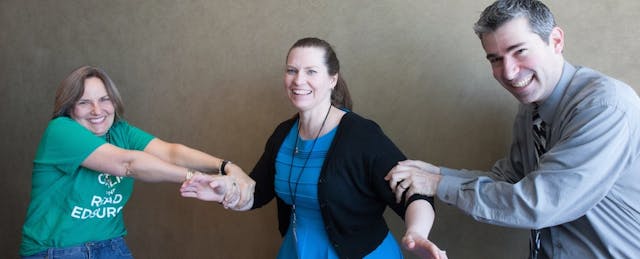Katrina Stevens, who led the EdSurge Summit team for a year and played a pivotal role in startup EdtechMaryland at the same time, has settled for one job--this with the US Department of Education as a senior advisor in the office of educational technology. She will work directly with Richard Culatta (right).
At the Dept. of Education, Stevens expects to take a leading role in building out the concept of collaboration through "innovation clusters." Key to robust clusters, as defined by the department, will be partnerships cut across historic silos--partnerships that include education organizations from schools and districts to students and libraries, to companies and to researchers studying outcomes. "The main goal is to bring together all the stakeholders in a way that will make better tools--and will create really helpful information for districts and school leaders."
Few people have as diverse a background--and life-long commitment to building partnerships as Stevens has. (EdSurge recently wrote about her work here.) And edtech clusters are an idea that is ripe for putting into practice. Among the emerging groups: Chicago's LEAP Innovations program, Silicon Valley's iHub and others. Last fall, Digital Promise convened a gathering of education leaders in Pittsburgh to discuss innovation clusters. And momentum is growing: to think through how to catalyze clusters, Digital Promise recently tapped Steven Hodas, formerly Executive Director of New York City's Office of Innovation and now a Practitioner in Residence at the Center on Reinventing Public Education.
Stevens is likely to have a role in other key projects at the department, from the next version of the National Education Technology Plan (due out this summer) to the ongoing Future Ready project, now spearheaded by the Alliance for Excellent Education. And she will become an advisor to Edtech Maryland.
What she excelled at during her tenure at EdSurge and will continue to do on the federal stage is bringing together different--sometimes even competing--interests, while keeping a clear focus on student outcomes. And in driving action.
"We should be able to see some early prototypes of what rapid-cycle research looks like ideally in the next year," Stevens says. "We'll also get a better understanding of the research that's already been done and identify who out there is doing this work--and how to get clusters to coordinate more with one another."
And knowing her as we do, EdSurge will be on the lookout for changes even sooner! Good luck, Katrina!


